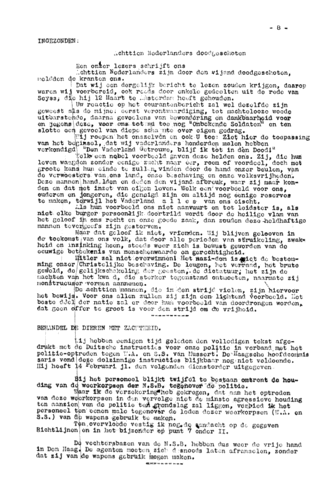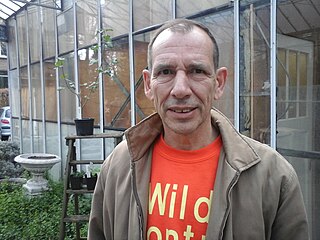Related Research Articles

Het Parool is an Amsterdam-based daily newspaper. It was first published on 10 February 1941 as a resistance paper during the German occupation of the Netherlands (1940–1945). In English, its name means The Password or The Motto.

Trouw is a Dutch daily newspaper appearing in compact size. It was founded in 1943 as an orthodox Protestant underground newspaper during World War II. Since 2009, it has been owned by DPG Media. Trouw received the European Newspaper Award in 2012. Cees van der Laan is the current editor-in-chief.
The Stripschapprijs is a Dutch prize awarded to comic creators for their entire body of work. It is awarded annually by the Stripschap, the Dutch Society of comics fans, since 1974. The prize is non-pecuniary, but is considered the most important award for comics in the country.

Chipknip was a stored-value payment card system used in the Netherlands. Based on the Belgian Proton system, it was started by Interpay on October 26, 1995, as a pilot project in the city of Arnhem and a year later rolled out countrywide. Chipknip was taken over by Currence due to a restructuring on May 17, 2005, who managed it with their licensees until its discontinuation on January 1, 2015. The Chipknip was primarily used for small retail transactions, as the card could contain a maximum value of 500 euros. The money needed to be transferred from a card holders main bank account using a loading station which were generally located next to ATMs.

The Netherlands Film Festival is an annual film festival, held in September and October of each year in the city of Utrecht.
The Anne Vondeling prize, named after the politician Anne Vondeling a member of the Dutch Labour Party, is an annual award in The Netherlands given to journalists who write in a clear manner concerning political subjects.

DPG Media Group is a Belgian media company also active in the Netherlands and Denmark. It is owned by the Van Thillo family and employs some 6,000 people.

RTL Nederland is a Dutch media network, a subsidiary of the RTL Group. The media company is located in Hilversum, although the licences of its TV stations are issued in Luxembourg.
Vietnamese people in the Netherlands form one of the smaller overseas Vietnamese communities of Europe. They consist largely of refugees from the former South Vietnam, Vietnamese born-citizens and their descendants.
Marinus Franciscus Johannes "Marijn" Backer is a Dutch educator, poet, and writer.

The Groningen gas field is a natural gas field in Groningen province in the northeastern part of the Netherlands. With an estimated 2,740 billion cubic metres of recoverable natural gas it is the largest natural gas field in Europe and one of the largest in the world.

Netherlands–Suriname relations refers to the current and historical relations between the Netherlands and Suriname. Both nations share historic ties and a common language (Dutch) and are members of the Dutch Language Union.

Republicanism in the Netherlands is a movement that strives to abolish the Dutch monarchy and replace it with a republic. The popularity of the organised republican movement that seeks to abolish the monarchy in its entirety has been suggested to be a minority among the people of the Netherlands, according to opinion polls. On the other hand, there has shown to be political and popular support in the Netherlands for reducing the political powers and the subsidies of the royal house.

PIN was a debit card brand in the Netherlands from 1990 until 2012, owned by Currence. PIN was a magnetic stripe card, which never migrated to the EMV chip. It was therefore discontinued in 2012, after the switch-over from magnetic stripe authentication to EMV chip authentication in the Netherlands was completed. PIN was replaced by Maestro and V Pay debit cards, but as most PIN cards were already co-branded with Maestro long before 2012, consumers noticed little of the change.

Interpay Nederland B.V. was the Dutch payment processor and payment product provider from 1994 to 2006. Interpay owned PIN, Chipknip, Acceptgiro and Incasso. In 2005, they spun off Currence and in 2006 they merged to form Equens.

Anet Bleich is a Dutch journalist, political commentator, author, columnist and writer.
André van Duren is a Dutch film director. He has directed several films which won the Golden Film award for success at the box office.

Bernardus Stefanus Henricus (Ben) Zegers is a Dutch visual artist, active as a sculptor and installation artist, and teacher and coordinator at the Gerrit Rietveld Academy.
Hendricus "Dick" Dankers was a Dutch furniture designer, and founder and gallery owner of The Frozen Fountain on the Prinsengracht in Amsterdam. He is remembered as "the man who brought the Netherlands to design."
Thimo te Duits is a Dutch art historian, curator, author and editor, known for his numerous contributions in the field of Dutch applied art.
References
- ↑ "Bedrijf voor elektronisch betalen opgericht". Nederlands Dagblad .
- ↑ "Tankstations Esso krijgen Beanet betaalsysteem". De Volkskrant . March 21, 1990.
- ↑ "Beanet breekt oppositie tegen elektronisch betalen". NRC Handelsblad .
- ↑ "Van Rooy wil af van monopolie Beanet". Trouw .
- ↑ "Fusie tussen BGC, BeaNet en Eurocard". NRC (in Dutch). Retrieved 2022-08-03.
- ↑ Trouw, 4 February 1993: Giirale, Eurocard en Beanet gaan samenwerken